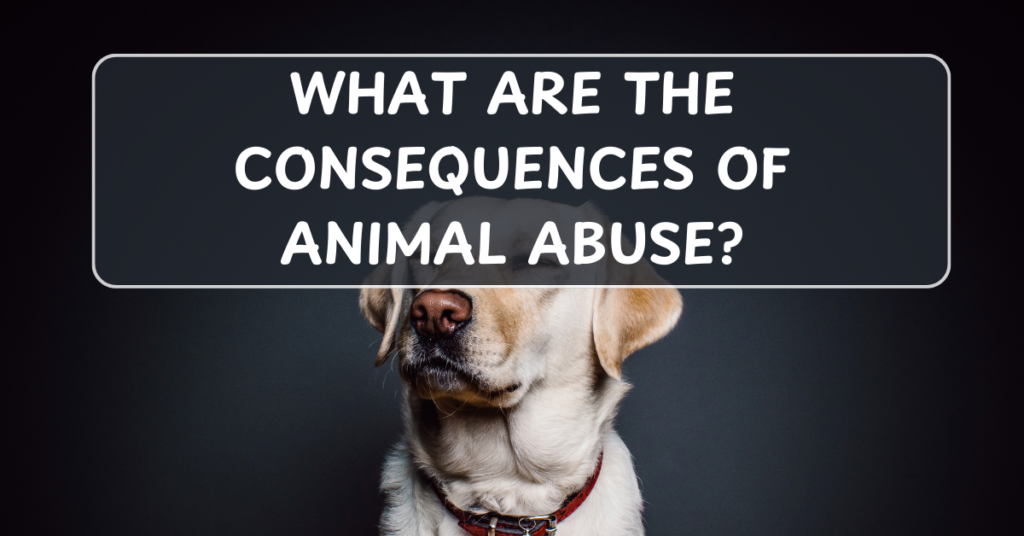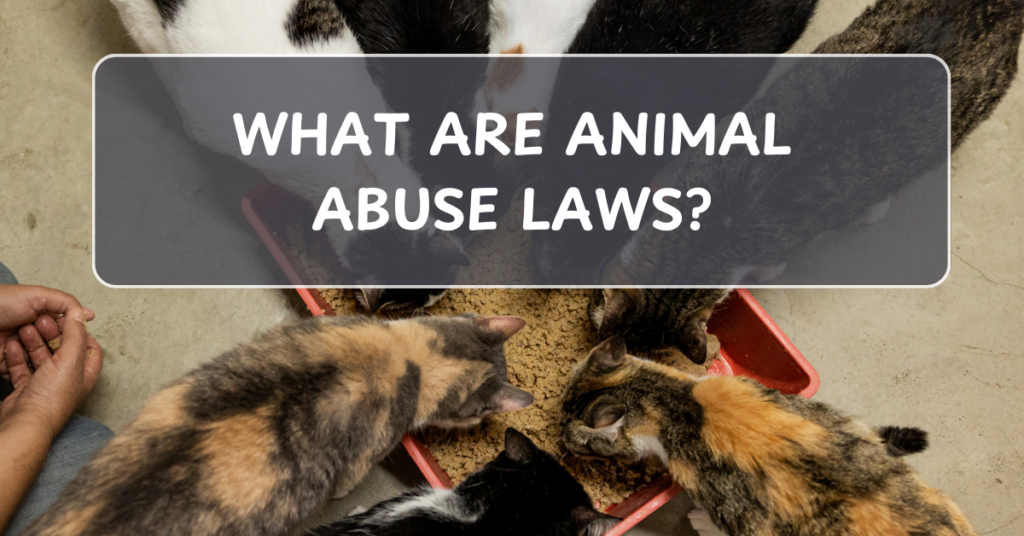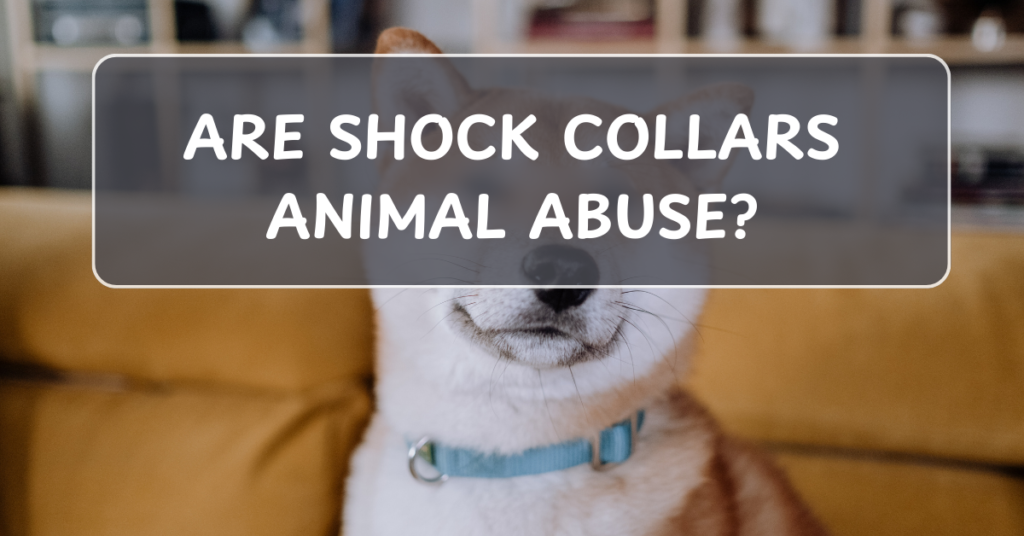
Animal abuse is the intentional mistreatment, harm, or neglect of animals, and it has serious consequences that extend beyond the immediate suffering of the animal. These consequences can affect the animal itself, the abuser, society, and even the wider environment. Understanding the potential impacts of animal abuse is important for addressing and preventing such behavior.
1. Consequences for the Animal
a. Physical Harm
The most immediate and obvious consequence of animal abuse is physical injury. Depending on the nature of the abuse, animals may suffer from:
- Wounds and injuries: Bruises, broken bones, burns, and internal injuries.
- Chronic pain: Physical abuse can cause long-term pain, making it difficult for the animal to move or perform normal activities.
- Death: In severe cases, animal abuse can lead to death from blunt force trauma, poisoning, or neglect.
b. Emotional and Psychological Damage
Animals that experience abuse can develop emotional trauma that may last long after the physical injuries have healed. Common psychological consequences include:
- Fear and anxiety: Abused animals may become fearful of humans, certain environments, or specific actions, leading to stress and anxiety.
- Behavioral issues: Abused animals often display aggressive or withdrawn behaviors, making it difficult for them to interact normally with people or other animals.
- Post-traumatic stress disorder (PTSD): Similar to humans, animals can experience symptoms of PTSD, such as hypervigilance, trembling, and avoidance.
c. Long-Term Health Problems
The effects of abuse often extend beyond the immediate trauma and can result in:
- Impaired health: Malnutrition, untreated injuries, or failure to receive proper medical care can lead to chronic health problems.
- Reproductive issues: Abused animals, especially those subjected to neglect or poor living conditions, may have trouble reproducing or may experience complications during pregnancy.
2. Consequences for the Abuser
a. Legal Consequences
In many regions, animal abuse is illegal, and those found guilty can face serious legal penalties, including:
- Criminal charges: Animal cruelty is often classified as a felony or misdemeanor, depending on the severity of the abuse. Convictions can lead to fines, probation, and imprisonment.
- Civil suits: In some cases, the abuser may face lawsuits for damages if the abuse leads to the animal’s death or requires costly medical care.
- Loss of rights to own animals: Courts may impose restrictions on an abuser’s ability to own or care for animals in the future, including bans on pet ownership or animal-related activities.
b. Psychological and Behavioral Consequences
Abusing animals is often a sign of deeper psychological issues or behavioral disorders. Some of the consequences for the abuser include:
- Escalating violence: Research has shown that people who abuse animals may be more likely to commit violent acts against humans, including domestic violence and child abuse. Animal abuse is often considered a warning sign of future violent behavior.
- Desensitization to violence: Repeated abuse of animals can lead to a desensitization to violence, where the individual may become less empathetic and more prone to violent actions.
3. Consequences for Society
a. Correlation with Human Violence
Numerous studies have established a link between animal abuse and violence against humans. Those who abuse animals are statistically more likely to commit violent crimes, such as domestic violence, child abuse, and homicide. This connection is so strong that law enforcement agencies often use evidence of animal abuse to identify potential serial offenders.
b. Public Safety Risks
In some cases, abused animals may pose a danger to the community. For example:
- Aggressive behavior: Abused animals, especially dogs, may become aggressive as a response to trauma, potentially leading to attacks on people or other animals.
- Spread of diseases: Neglected or abused animals, particularly in overcrowded or unsanitary conditions, may spread diseases like rabies, parasites, or zoonotic infections, which can be harmful to humans.
c. Environmental Impact
Abuse of wildlife or domesticated animals can have environmental consequences as well. For example:
- Disruption of ecosystems: The illegal hunting or abuse of wildlife, such as poaching or trophy hunting, can destabilize local ecosystems, impacting biodiversity and the health of species.
- Wildlife trafficking: The abuse of animals for entertainment, sport, or trade can lead to the illegal wildlife trade, which poses a threat to endangered species and ecosystems.
4. Consequences for Animal Welfare Organizations
Animal abuse also impacts animal welfare organizations and shelters. The consequences can include:
- Increased workload: Abused animals often require extensive care, medical treatment, and rehabilitation, placing a strain on shelters, veterinarians, and rescue organizations.
- Resource depletion: Animal welfare groups may struggle to meet the increased demand for resources, including food, medical supplies, and staff, as they care for abused animals.
- Emotional toll on staff: Animal welfare workers and volunteers may experience emotional burnout from repeatedly witnessing abuse and caring for traumatized animals.
5. Prevention and Long-Term Effects
The long-term consequences of animal abuse can be devastating not only for the animals involved but also for the broader community. To prevent abuse, it is important for society to:
- Promote awareness: Educating the public about the signs of animal abuse and the importance of humane treatment can help prevent mistreatment.
- Strengthen laws: Enforcing strict animal cruelty laws and holding abusers accountable is essential in curbing the incidence of abuse.
- Support animal protection programs: Providing resources for animal welfare organizations, as well as supporting adoption and rescue initiatives, helps reduce the number of abused animals in need of care.
Conclusion
The consequences of animal abuse are wide-ranging and far-reaching, impacting not just the abused animals but also the abusers, society, and the environment. Animal abuse can lead to severe physical and emotional trauma for the animals involved, while also posing serious legal, psychological, and societal risks. It is crucial to take a stand against animal abuse, support laws and programs that protect animals, and promote more humane treatment of all living creatures.


